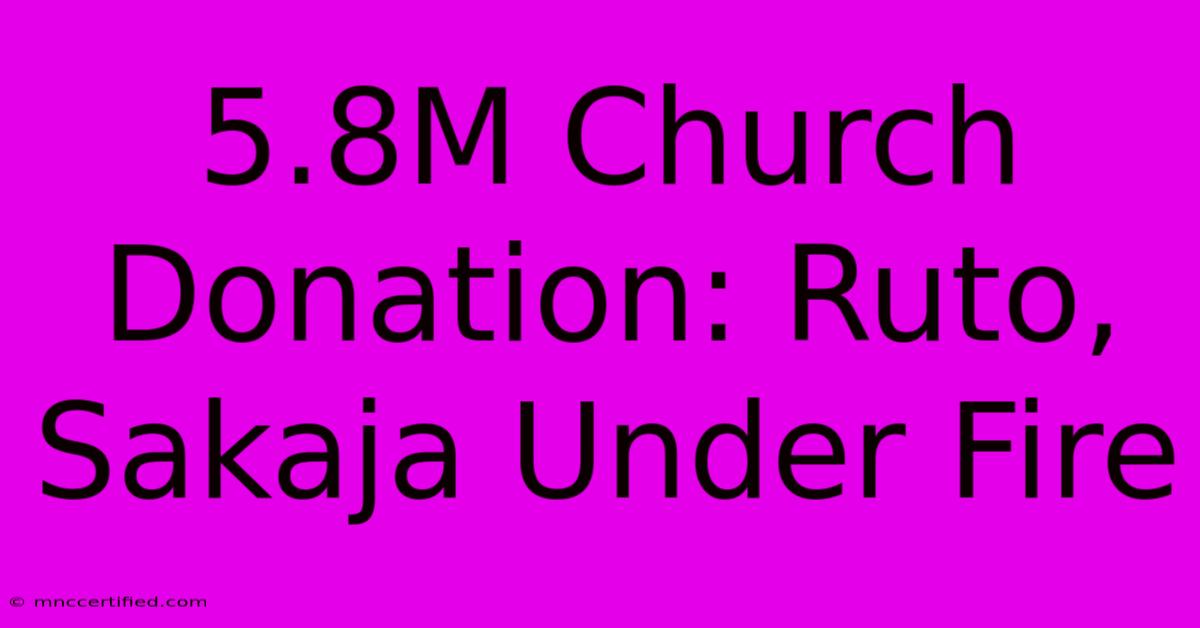5.8M Church Donation: Ruto, Sakaja Under Fire

Table of Contents
5.8M Church Donation: Ruto, Sakaja Under Fire – A Deep Dive into the Controversy
The recent donation of Ksh 5.8 million to a church by Deputy President William Ruto and Nairobi Governor Johnson Sakaja has ignited a firestorm of controversy in Kenya. While presented as an act of generosity, the donation has faced intense scrutiny, raising questions about transparency, accountability, and the potential misuse of public funds. This article delves deep into the details of the controversy, examining the arguments from both sides and exploring the broader implications.
The Donation and the Fallout
The Ksh 5.8 million donation, made during a church service, was lauded by some as an act of faith and community support. However, critics swiftly pointed to the timing and context of the donation, arguing it smacked of political maneuvering and a possible attempt to curry favor with churchgoers ahead of the 2027 general elections. The lack of transparency regarding the source of the funds further fueled the controversy. Was this personal wealth, or were public funds diverted? This crucial question remains unanswered, leading to widespread public distrust.
Key Arguments Against the Donation:
-
Lack of Transparency: The most significant criticism revolves around the opacity surrounding the origin of the funds. The absence of clear accounting and disclosure raises concerns about potential misuse of public funds, whether directly or indirectly. This lack of transparency undermines public trust and fuels accusations of impropriety.
-
Political Motivation: Many observers believe the donation is a calculated political move designed to garner support from the church's congregation. Kenya's religious landscape is significant, and courting religious leaders and their followers is a common tactic in Kenyan politics. Critics argue this undermines the integrity of both religious institutions and the political process.
-
Misuse of Public Resources: The central concern is the potential misuse of public funds. Even if the money wasn't directly from public coffers, the perception of using resources meant for public services for political gain is damaging. This erodes public confidence in government institutions and elected officials.
Arguments in Defense of the Donation:
-
Act of Philanthropy: Supporters argue the donation was a purely charitable act, driven by the leaders' personal faith and commitment to community development. They emphasize the importance of supporting religious institutions, which often play vital roles in community service and social welfare.
-
Right to Donate: Some argue that both Ruto and Sakaja have a right to donate their personal wealth as they see fit, regardless of public perception. This argument centers on individual freedom and the right to charitable giving.
-
Economic Contribution: Proponents might argue that the donation contributes to the economic well-being of the church and its community. This would justify the donation from an economic development perspective.
The Broader Implications
This controversy extends far beyond a simple donation. It highlights crucial issues regarding:
-
Financial Accountability of Public Officials: The incident underscores the urgent need for greater transparency and accountability in the management of public funds by elected officials. Stricter regulations and mechanisms for oversight are essential.
-
The Role of Religion in Politics: The incident raises questions about the appropriate boundaries between religion and politics. The intertwining of religious institutions and political campaigns can lead to ethical dilemmas and potential exploitation.
-
Public Trust and Confidence: The lack of transparency and the perception of political maneuvering have severely eroded public trust and confidence in both Ruto and Sakaja's leadership. Rebuilding this trust will require significant effort and demonstrable commitment to transparency and accountability.
Conclusion: The Need for Reform
The 5.8M church donation controversy serves as a stark reminder of the need for increased transparency and accountability in Kenyan politics. Strengthening ethical guidelines, implementing robust oversight mechanisms, and promoting a clearer separation between religion and politics are crucial steps toward restoring public trust and ensuring responsible governance. The ongoing debate underscores the vital importance of open dialogue and critical scrutiny of public officials' actions. Only through such scrutiny can Kenya strive for a more just and equitable society.
Keywords: Ruto, Sakaja, Church donation, Kenya, 5.8M, controversy, political donation, transparency, accountability, public funds, misuse of funds, religious institutions, politics, corruption, public trust, ethical concerns, Kenyan politics, 2027 elections.

Thank you for visiting our website wich cover about 5.8M Church Donation: Ruto, Sakaja Under Fire. We hope the information provided has been useful to you. Feel free to contact us if you have any questions or need further assistance. See you next time and dont miss to bookmark.
Featured Posts
-
Live Score Kentucky Wildcats Vs Cardinals
Dec 01, 2024
-
Big 12 Watch Asus Path To The Title
Dec 01, 2024
-
Shelter Insurance Chaffee Mo
Dec 01, 2024
-
Buckeyes Bolster Wide Receiver Room
Dec 01, 2024
-
Day Trading Conferences 2024
Dec 01, 2024